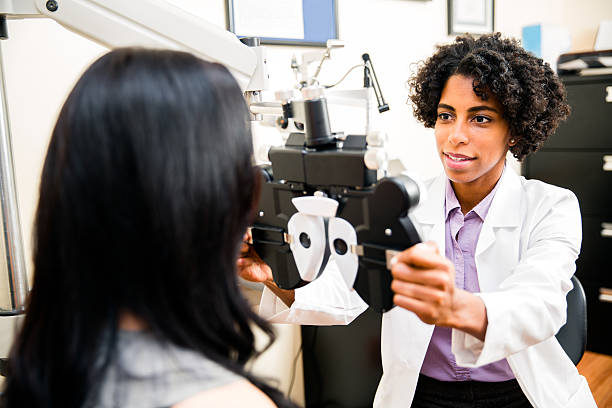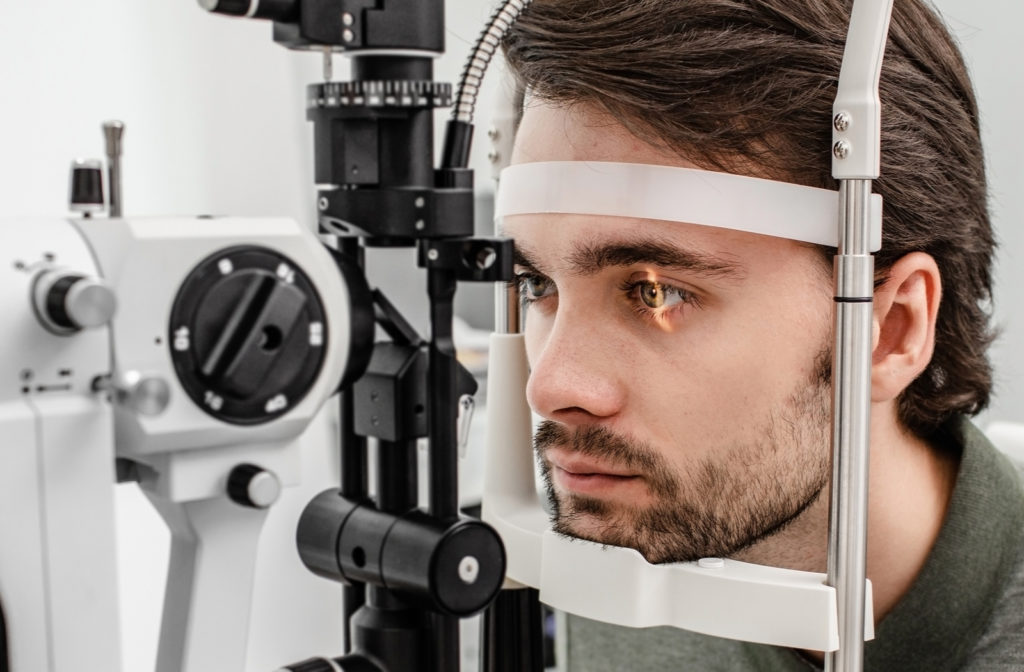Trusted Eye Doctor Montgomery for Vision Treatment
Trusted Eye Doctor Montgomery for Vision Treatment
Blog Article
Just How an Optometrist Can Aid Prevent and Manage Common Vision Problems Efficiently
The function of an eye doctor extends far beyond just prescribing glasses; it includes a thorough approach to stopping and handling various vision troubles. By establishing individualized treatment plans and providing advice on preventative treatment techniques, eye care experts make sure that people are geared up to preserve ideal eye health.
Importance of Normal Eye Exams

Additionally, routine eye tests can disclose systemic health concerns, including diabetes and high blood pressure, as the eyes commonly mirror adjustments in general health. Developing a routine timetable for eye examinations, typically every one to 2 years, enables for prompt treatments and can help protect vision.
Individuals in certain age or with certain danger elements, such as a family members background of eye illness or chronic health and wellness conditions, might take advantage of even more constant assessments. By prioritizing these appointments, clients can ensure they receive customized treatment customized to their unique needs. Eventually, routine eye examinations play a crucial role in both proactive and precautionary eye treatment, making it possible for individuals to keep their top quality of life and aesthetic function.
Early Discovery of Vision Problems
Early discovery of vision troubles is crucial for effective administration and treatment, as prompt intervention can considerably reduce the progression of eye problems. Routine eye assessments act as a vital tool in recognizing prospective problems before they escalate into more extreme conditions. Eye physicians use different diagnostic methods to evaluate visual acuity, eye positioning, and total eye health and wellness, allowing them to find problems at an onset.
Common vision issues, such as refractive errors, cataracts, and glaucoma, may not present recognizable signs initially. Therefore, regular testings are crucial for people of every ages, especially those with a family members history of eye conditions or other danger variables. Early identification enables prompt references to professionals and can lead to better results, lowering the possibility of complications.
In addition, innovations in modern technology have enhanced the capability to diagnose conditions early, therefore enhancing the performance of subsequent treatments. Clients need to be proactive in organizing normal appointments and connecting any adjustments in their vision to their eye care supplier. By focusing on early detection, individuals can take considerable strides toward maintaining their vision and maintaining general eye health.
Personalized Treatment Plans
When vision problems are determined, the formulation of individualized treatment plans comes to be crucial to deal with the special requirements of each person. Eye physicians make use of comprehensive assessments, including visual acuity tests, refraction analyses, and eye health assessments, to collect vital details regarding a person's particular problems. This data assists in designing targeted interventions that line up with the person's way of living, choices, and total wellness status.
Customized treatment plans might incorporate a variety of choices, including corrective lenses, medicines, or advanced therapies tailored to certain conditions such as glaucoma, macular deterioration, or diabetic retinopathy. In content addition, the incorporation of educational parts is vital, as clients are notified regarding their conditions and the reasoning behind the chosen therapy methods. This collaborative technique fosters a better feeling of ownership and adherence to the treatment program.
In addition, follow-up appointments are essential for keeping track of development and making modifications as required. By focusing on customized therapy plans, eye care specialists can not just improve the effectiveness of interventions but also enhance the overall lifestyle for their people, encouraging them to manage their vision health proactively and effectively.
Preventative Treatment Strategies
Preventative care strategies play an essential role in keeping ideal eye health and protecting against the start of vision troubles. Routine eye assessments are fundamental, as they permit eye care specialists to discover possible problems early, also before signs and symptoms show. These exams can determine refractive errors, cataracts, and glaucoma, making it possible for prompt treatment.
In enhancement to routine appointments, embracing a healthy and balanced way of life considerably adds to eye health and wellness. A balanced diet regimen abundant in vitamins A, C, E, and omega-3 fatty acids can enhance visual feature and minimize the risk of age-related macular deterioration. Additionally, securing click now the eyes from damaging ultraviolet (UV) rays by wearing sunglasses with correct UV security is vital in avoiding problems like cataracts.
Restricting display time and practicing the 20-20-20 rule-- taking a look at something 20 feet away for 20 seconds every 20 mins-- can alleviate electronic eye stress. Regularly taking part in exercise additionally promotes overall health, including eye health and wellness. Last but not least, staying clear of smoking is vital, as it boosts the danger of numerous eye conditions. By implementing these preventative care methods, people can dramatically boost their eye health and decrease the probability of developing major vision issues. eye doctor.

Duty in Managing Chronic Issues
Managing persistent conditions often requires a joint technique, and eye physicians play a crucial role in this process. Lots of systemic illness, such as diabetes mellitus and hypertension, have substantial ocular effects you could try this out that can affect vision. Eye physicians are vital in surveillance and handling these problems, as they can discover very early indications of difficulties that may not be noticeable to the patient or medical care copyright.
For example, diabetic retinopathy is an usual repercussion of unmanaged diabetic issues, and regular eye examinations can facilitate early intervention, protecting against severe vision loss. Optometrist can also supply tailored recommendations regarding lifestyle changes and needed clinical references to make certain comprehensive client care.
Furthermore, problems like autoimmune conditions might show ocular signs, requiring an eye doctor's competence in both vision care and the underlying systemic issues. eye doctor. By working closely with medical care physicians and various other experts, eye doctors help coordinate treatment approaches that incorporate both aesthetic and general wellness

Final Thought
In final thought, the function of an eye doctor is important in stopping and handling typical vision issues. Regular eye tests facilitate early detection of problems, allowing personalized treatment plans customized to individual requirements. Via the application of preventative care approaches and attentive monitoring of persistent conditions, ophthalmologist contribute significantly to the improvement of overall vision wellness. The positive strategy adopted by these professionals emphasizes the importance of preserving optimum eye wellness throughout life.
By developing personalized therapy strategies and providing advice on preventative care methods, eye care specialists ensure that individuals are equipped to preserve optimum eye health.Routine eye examinations are important for keeping optimal vision and general eye wellness. During an eye test, an eye care expert assesses aesthetic skill, assesses the wellness of the eyes, and may do tests to inspect for conditions such as glaucoma, cataracts, and macular deterioration.
Eye physicians utilize numerous diagnostic techniques to analyze visual skill, eye placement, and overall eye health, enabling them to spot abnormalities at a very early phase.
Routine eye evaluations are basic, as they permit eye treatment professionals to discover potential concerns early, even prior to signs show. (eye doctor)
Report this page